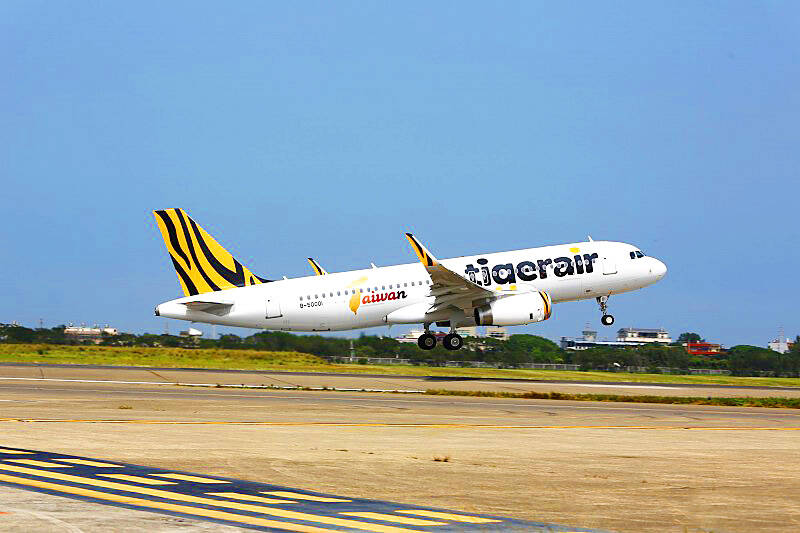Tigerair Taiwan Ltd (台灣虎航) is to list its shares on the Taiwan Stock Exchange’s Taiwan Innovation Board (TIB) in the third quarter of this year, the exchange said on Friday.
The budget carrier’s shares have been trading on the Taiwan Stock Exchange’s Emerging Stock Board since December 2019.
Tigerair Taiwan was established in April 2014 as a joint venture between China Airlines Ltd (CAL, 中華航空) and Singapore’s Tiger Airways Ltd, with CAL holding a 90 percent stake. In 2017, CAL acquired the remaining 10 percent from Tiger Airways to make Tigerair Taiwan its wholly owned subsidiary.

Photo courtesy of Tigerair Taiwan Ltd
CAL currently owns a 78.41 percent stake in Tigerair Taiwan, with Mandarin Airlines Ltd (華信航空), another CAL subsidiary, holding a 3.86 percent stake and Cathay Life Insurance Co (國泰人壽) taking a 2.49 percent share, according to the budget carrier’s prospectus published last month.
Tigerair Taiwan, which has NT$4 billion (US$131.3 million) in paid-in capital, incurred a net loss of NT$2.85 billion last year, extending from a net loss of NT$2.27 billion a year earlier, while its sales rose to NT$1.31 billion from NT$244 million in 2021, the prospectus showed.
The airline offers flights to 25 destinations in the region. Its revenue accounts for 2.64 percent of the total revenue of Taiwan’s international carriers. EVA Airways Corp (長榮航空) leads with 37.52 percent of overall revenue, followed by CAL with 25.62 percent and Starlux Airlines Co (星宇航空) with 5.73 percent.
CAL and EVA listed their shares on the local main board in 1993 and 2001 respectively, while StarLux listed its shares on the Emerging Stock Board in September last year.
Separately, the Taiwan Stock Exchange on Friday said that its board approved an application by Gogolook Inc (走著瞧), a trust tech services provider, to list its shares on the TIB in the third quarter.
The exchange launched the TIB in July 2021. It aims to encourage companies with key technologies and innovation capabilities to raise funds on capital markets, and “help companies achieve faster growth and sustainable development.”
According to the rules governing TIB listings, profitability is no longer the main listing standard.
The board would inject capital into the innovation ecosystem, build new financing sources, highlight the value of start-ups and foster the virtuous cycle of economic development, the exchange has said.

Semiconductor business between Taiwan and the US is a “win-win” model for both sides given the high level of complementarity, the government said yesterday responding to tariff threats from US President Donald Trump. Home to the world’s largest contract chipmaker, Taiwan Semiconductor Manufacturing Co (TSMC, 台積電), Taiwan is a key link in the global technology supply chain for companies such as Apple Inc and Nvidia Corp. Trump said on Monday he plans to impose tariffs on imported chips, pharmaceuticals and steel in an effort to get the producers to make them in the US. “Taiwan and the US semiconductor and other technology industries

SMALL AND EFFICIENT: The Chinese AI app’s initial success has spurred worries in the US that its tech giants’ massive AI spending needs re-evaluation, a market strategist said Chinese artificial intelligence (AI) start-up DeepSeek’s (深度求索) eponymous AI assistant rocketed to the top of Apple Inc’s iPhone download charts, stirring doubts in Silicon Valley about the strength of the US’ technological dominance. The app’s underlying AI model is widely seen as competitive with OpenAI and Meta Platforms Inc’s latest. Its claim that it cost much less to train and develop triggered share moves across Asia’s supply chain. Chinese tech firms linked to DeepSeek, such as Iflytek Co (科大訊飛), surged yesterday, while chipmaking tool makers like Advantest Corp slumped on the potential threat to demand for Nvidia Corp’s AI accelerators. US stock

The US Federal Reserve is expected to announce a pause in rate cuts on Wednesday, as policymakers look to continue tackling inflation under close and vocal scrutiny from US President Donald Trump. The Fed cut its key lending rate by a full percentage point in the final four months of last year and indicated it would move more cautiously going forward amid an uptick in inflation away from its long-term target of 2 percent. “I think they will do nothing, and I think they should do nothing,” Federal Reserve Bank of St Louis former president Jim Bullard said. “I think the

SUBSIDIES: The nominee for commerce secretary indicated the Trump administration wants to put its stamp on the plan, but not unravel it entirely US President Donald Trump’s pick to lead the agency in charge of a US$52 billion semiconductor subsidy program declined to give it unqualified support, raising questions about the disbursement of funds to companies like Intel Corp and Taiwan Semiconductor Manufacturing Co (台積電). “I can’t say that I can honor something I haven’t read,” Howard Lutnick, Trump’s nominee for commerce secretary, said of the binding CHIPS and Science Act awards in a confirmation hearing on Wednesday. “To the extent monies have been disbursed, I would commit to rigorously enforcing documents that have been signed by those companies to make sure we get